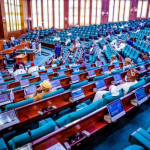A day after Prime Minister of Bangladesh, Sheikh Hasina resigned and fled following a violent insurrection, protesting student leaders demanded on Tuesday that parliament be dissolved and threatened to implement a “strict programme” if their deadline was not met.
Bangladesh’s army chief, General Waker-Uz-Zaman, was scheduled to meet with student leaders at 0600 GMT to discuss the establishment of an interim administration, which is anticipated to hold elections soon after taking power.
Mr. Zaman announced Hasina’s resignation on Monday, following days of student protests against government job quotas that developed into a widespread movement calling for Hasina’s removal.
Clashes swept across the nation, resulting in thousands of injuries and about 300 deaths, some of the worst violence Bangladesh has seen since its 1971 war of independence from Pakistan.
The capital city of Dhaka saw some resumption of normalcy earlier on Tuesday, despite lighter traffic and a small number of schools reopening with low enrollment following their mid-July closure due to demonstrations.
A spokesman for Nobel Peace winner Muhammad Yunus announced that Yunus has accepted to the student leaders’ demand that he serve as the temporary government’s senior adviser.
Yunus, 84, and his Grameen Bank won the 2006 Nobel Peace prize for work to lift millions out of poverty by granting tiny loans of under $100 to the rural poor of Bangladesh but he was indicted by a court in June on charges of embezzlement that he denied.
India’s Foreign Minister Subrahmanyam Jaishankar addressed a closed door all-party meeting on Tuesday morning about the crisis in Bangladesh and he was due to speak in parliament later in the day.














